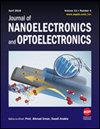Analysis on Performances and Flow Fields of a Single Waterjet Propeller Based on SST k −ω Model
IF 0.6
4区 工程技术
Q4 ENGINEERING, ELECTRICAL & ELECTRONIC
引用次数: 0
Abstract
As a special method of ship propulsion, waterjet propeller has been widely used in military and civilian fields due to its advantages of simple structures and high propulsion efficiency. Affected by waves of sea and rotation of impeller, the internal flow of waterjet propeller is extremely complex on three dimensions. When waterjet propeller works, its turbulent flow is often accompanied with unstable phenomena like flow separation, secondary flow, and backflow. On the other hand, the impeller of the propeller will be easily cavitated if it runs at high speed. That has a serious impact on performance and structure of the propeller. Therefore, understanding the open water performance and cavitation characteristics is imperative. In this study, we analyze the performance and flow field of a single marine external waterjet propeller based on the SST k−ω model. We focus on examining its performance under various advance coefficients in open water conditions. The experimental results show that the distributions of streamline and inlet velocity are more uniform at the highest efficiency point than other operating conditions. The loss for the generation of entropy is relatively low at the same time. The analysis on cavitation shows that the volume of the cavitation bubble will increase gradually as the cavitation number of the propeller decreases. Meanwhile, the performance of the propeller decreases obviously at the blade tip extending from the rim to the hub.基于 SST k -ω 模型的单喷水推进器性能和流场分析
作为一种特殊的船舶推进方式,喷水推进器以其结构简单、推进效率高等优点,在军事和民用领域得到了广泛应用。受海浪和叶轮旋转的影响,喷水推进器内部的三维流动极为复杂。喷水推进器工作时,其湍流往往伴随着分流、二次流和回流等不稳定现象。另一方面,螺旋桨的叶轮在高速运转时容易产生气蚀。这对螺旋桨的性能和结构造成严重影响。因此,了解开阔水域的性能和气蚀特性势在必行。在本研究中,我们基于 SST k-ω 模型分析了单个船用外喷水推进器的性能和流场。我们重点研究了其在开阔水域条件下不同推进系数下的性能。实验结果表明,与其他工作条件相比,最高效率点的流线和进口速度分布更为均匀。同时,产生熵的损失也相对较低。空化分析表明,随着螺旋桨空化数的减少,空化泡的体积会逐渐增大。同时,螺旋桨的性能在叶尖从叶缘延伸到叶毂处明显下降。
本文章由计算机程序翻译,如有差异,请以英文原文为准。
求助全文
约1分钟内获得全文
求助全文
来源期刊

Journal of Nanoelectronics and Optoelectronics
工程技术-工程:电子与电气
自引率
16.70%
发文量
48
审稿时长
12.5 months
 求助内容:
求助内容: 应助结果提醒方式:
应助结果提醒方式:


